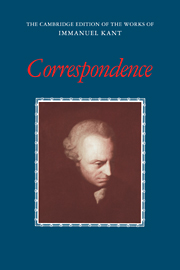Book contents
- Frontmatter
- Contents
- General Editors' Preface
- Acknowledgments
- Introduction
- Letters before 1770
- Letters 1770–1780
- Letters 1781–1789
- Letters 1790–1794
- 1790
- 1791
- 1792
- 1793
- 1794
- Letters 1795–1800
- Public Declaration concerning Fichte's Wissenschaftslehre, August 7, 1799
- Biographical Sketches
- Glossary
- Index of Persons
1793
from Letters 1790–1794
Published online by Cambridge University Press: 07 September 2010
- Frontmatter
- Contents
- General Editors' Preface
- Acknowledgments
- Introduction
- Letters before 1770
- Letters 1770–1780
- Letters 1781–1789
- Letters 1790–1794
- 1790
- 1791
- 1792
- 1793
- 1794
- Letters 1795–1800
- Public Declaration concerning Fichte's Wissenschaftslehre, August 7, 1799
- Biographical Sketches
- Glossary
- Index of Persons
Summary
Dear and revered Sir,
The reason I delayed so long in telling you of the pleasure your letter gave me is that I value your time too highly, so that I allow myself to pilfer some of it only when it will serve to relieve my heart and not merely satisfy an impulse, and this you have already done for me once, when my spirit was most turbulent and I appealed to you for help, you understood me so perfectly that because of your kindness and your precise comprehension of the human heart I am encouraged to describe to you without embarrassment the further progress of my soul. The lie on account of which I appealed to you was no cloaking of a vice but only a sin of omission, holding something back out of consideration for the friendship (still veiled by love) that existed then. The conflict I felt, foreseeing the terribly painful consequences and knowing the honesty one owes to a friend, was what made me disclose the lie to my friend after all, but so late. Finally I had the strength, and with the disclosure I got rid of the stone in my heart at the price of the tearing away of his love. I enjoyed as little peace before, when I begrudged myself the pleasure I possessed, as afterward, when my heart was torn apart by the suffering and anguish that plagued me and that I wouldn't wish on anyone, even someone who would want to prove his wickedness in a court of law.
- Type
- Chapter
- Information
- Correspondence , pp. 450 - 473Publisher: Cambridge University PressPrint publication year: 1999

